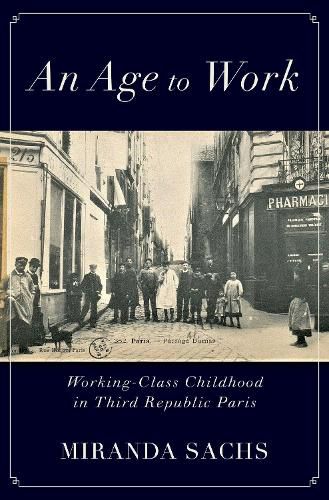Readings Newsletter
Become a Readings Member to make your shopping experience even easier.
Sign in or sign up for free!
You’re not far away from qualifying for FREE standard shipping within Australia
You’ve qualified for FREE standard shipping within Australia
The cart is loading…






In the final decades of the nineteenth century, the French Third Republic attempted to carve out childhood as a distinct legal and social category. Previously, working-class girls and boys had labored and trained alongside adults. Concerned about future citizens, lawmakers expanded access to education, regulated child labor, and developed child welfare programs. They directed working-class youths to age-segregated spaces, such as vocational schools or juvenile prisons. With these policies, they distinguished the youthful worker from the adult worker and the juvenile delinquent from the adult criminal. Through their emphasis on age, these policies defined childhood as a universal stage of life. And yet, they also reproduced inequalities in the experience of childhood.In An Age to Work, Miranda Sachs considers the role of the welfare state in reinforcing class and gender-based divisions within childhood. She argues that agents of the welfare state, such as child labor inspectors and social workers, played a crucial role in standardizing the path from childhood to the workforce. By enforcing age-based rules, such as child labor laws, they attempted to protect working class children. But they also policed these chidren's productivity and enforced gender-specific labor practices. An Age to Work also enters the streets and apartments of working-class Paris to examine how the laboring classes envisioned and experienced childhood. Although working-class parents continued to see childhood as a more fluid category, they agreed with state actors that their offspring should grow up to be productive. They too mobilized the welfare state to ensure this outcome. By interrogating these diverse perspectives, An Age to Work reveals that the same sort of welfare system that created social hierarchies in France's colonies reinforced the class system at home.
$9.00 standard shipping within Australia
FREE standard shipping within Australia for orders over $100.00
Express & International shipping calculated at checkout
In the final decades of the nineteenth century, the French Third Republic attempted to carve out childhood as a distinct legal and social category. Previously, working-class girls and boys had labored and trained alongside adults. Concerned about future citizens, lawmakers expanded access to education, regulated child labor, and developed child welfare programs. They directed working-class youths to age-segregated spaces, such as vocational schools or juvenile prisons. With these policies, they distinguished the youthful worker from the adult worker and the juvenile delinquent from the adult criminal. Through their emphasis on age, these policies defined childhood as a universal stage of life. And yet, they also reproduced inequalities in the experience of childhood.In An Age to Work, Miranda Sachs considers the role of the welfare state in reinforcing class and gender-based divisions within childhood. She argues that agents of the welfare state, such as child labor inspectors and social workers, played a crucial role in standardizing the path from childhood to the workforce. By enforcing age-based rules, such as child labor laws, they attempted to protect working class children. But they also policed these chidren's productivity and enforced gender-specific labor practices. An Age to Work also enters the streets and apartments of working-class Paris to examine how the laboring classes envisioned and experienced childhood. Although working-class parents continued to see childhood as a more fluid category, they agreed with state actors that their offspring should grow up to be productive. They too mobilized the welfare state to ensure this outcome. By interrogating these diverse perspectives, An Age to Work reveals that the same sort of welfare system that created social hierarchies in France's colonies reinforced the class system at home.